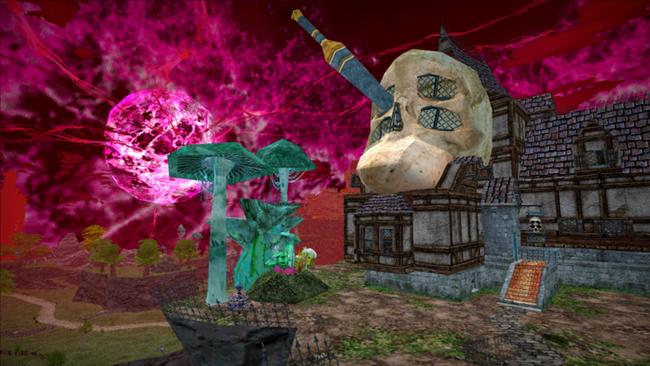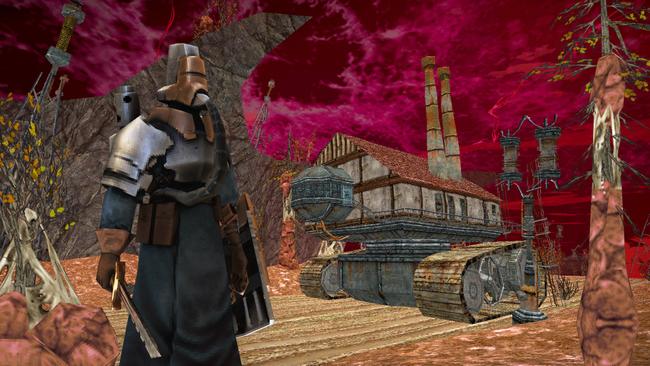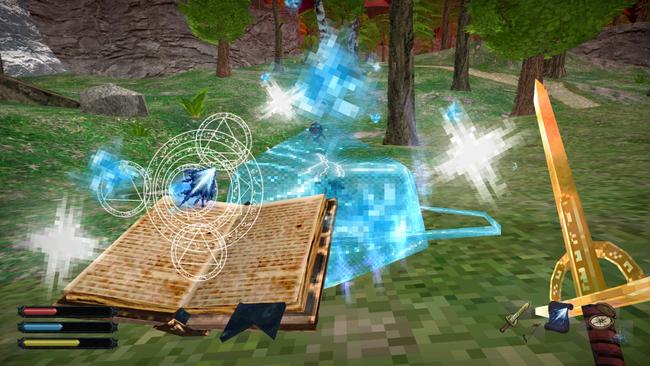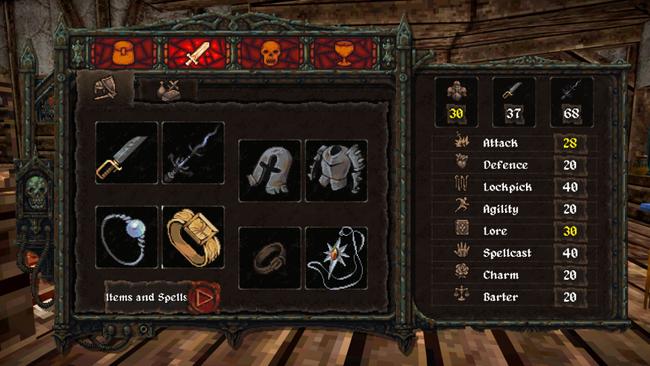
Dread Delusion Creative Director speaks on how flying islands helped development & why PS1 games are timeless
Back in May, Dread Delusion launched with its full 1.0 release and turned out to be a wonderful game. James praised the open-world horror RPG in his review despite running into a few bugs. Since its launch out of Early Access, there have been several patches that took care of the lingering bug issues and in late July, the title received a huge final update that included a Hard Mode and a free DLC that adds a brand-new region in the game.
We were able to meet with Dread Delusion's Creative Director, James Wragg, at PAX West 2024 for an extensive chat about it. He talks about the initial roots of the project, what he learned as a game developer throughout the lengthy development process, and how the PlayStation 1 not only inspired the visuals of Dread Delusion, but his own personal general philosophy on game design as well.
Even if you haven't played Dread Delusion yet, we highly encourage you give it a read! This is our special huge interview with James Wragg.

James Wragg, the Creative Director of Dread Delusion: In a way, my initial reaction was somewhat tempered by the fact that we launched into Early Access beforehand. The bigger reaction was when we launched into Early Access. Early Access is a weird way to do a RPG I guess, because not many - well, aside from Baldur’s Gate 3 that did do Early Access - most RPGs tend to launch when they’re done.
Wragg: We kind of bucked the trend a bit because for most Early Access games, the Early Access launch is the actual launch and the actual 1.0 launch is relatively smaller. For Dread Delusion, the 1.0 launch was big and I think that was because we had a RPG and a lot of people were just waiting to play the whole thing since it’s a story-based game.
That’s what I’m guessing; maybe we’ve also successfully managed to build hype throughout the release process. We got a lot of coverage at launch and that was great, which really helped. I was really pleased with the reaction and was kind of chuffed throughout it all. Good start to what was originally a very small project, so thanks to DreadXP for publishing it, funding it, and slowly growing it to something pretty big.
RPG Site: Dread Delusion definitely developed a substantial following. It found its audience, which is just so important for projects such as this.
Wragg: Even just being here at PAX West, so many people have come up and chatted with me about it which is quite humbling.

Wragg: That’s an interesting question. Probably the playstyles that surprised me most were just how lots of people, especially in Early Access, would just really quickly figure out how to break the game by jumping to the other floating islands. On our end, we made the flying islands separated by large spaces of air and we figured there’d be no way to jump across.
Then very quickly, people figured out and learned that they could slide down a mountain to get stuck in a little crevice and then hammer the space bar to build up speed or something. After that, they somehow kind of janked out of it to fly across the map, so people used this to get to late-game areas early. We built the game to allow for a lot of playstyles, but the ones that surprised us were the ones that used bugs to their advantage - which y’know, they’re having fun.
RPG Site: Are those glitches still in the game or have you patched them out?
Wragg: No, we’ve patched most of that. All of this mostly occurred when it was in Early Access. We did have a speedrunning community that got quite annoyed with us. They asked us to not patch out some of the speed bugs, but unfortunately we had to let them down.
Wragg: Actually the last thing that we added was a secret time trial at the airship where you have to pull a lever on this island somewhere, and then you have to find ten crystal skulls that are scattered all around the game. Some of them are in obvious places, but one of them is like in a pile of trash somewhere in the Clockwork Kingdom, so a few of the locations were a bit devious. I generally thought it would take people ages to figure it out and then someone did it in literally a day.
Probably the biggest kick in the teeth wasn’t that they did it that fast. They found the reward, which was a bespoke cabin for your airship that I spent a day making and thought was a cool cabin, and they beat it in a day and were just like “Don’t bother because the reward is really shitty.”
RPG Site: But the reward was the journey!
Wragg: Yeah yeah yeah, so here’s the thing - it’s kind of evoking those old PS1 challenges. If you remember in an early Tomb Raider, there was Lara Croft’s mansion. There’s a switch in a maze, and then you have to run back really quickly to get into a basement where she stores all her riches. There wasn’t even a reward; you just did it for the sake of doing it. So I thought even the reward was generous but y’know, apparently not quite.

Wragg: Yeah it was actually from the start. When I first started making weird levels in Unity, I made a flying island because it was an interesting way to basically make stuff easier. If you set something on a real place, you have to actually build mountains and put hills in the distance; you have to build a place. If you create a jagged island and plunk it into space, that’s easy to do. So, it started with experimenting with Unity, game development, and making surreal environments that are easier to build.
I’ll just make this surreal environment and use lore to explain why it looks quite surreal. I do think that limitations can often be creatively inspiring; if you set yourself a weird limitation, like I’m just going to make floating islands, then that can be a creative inspiration because you start asking yourself “why are these floating islands?” which can then lead to a development, such as “because the surface of the world is destroyed so people have fled to these flying islands.” The floating islands were always there from the start, but I almost used it as a narrative prompt.
Wragg: There’s a big Google doc lore bible that’s very long. There’s different writers for every area; Io and Ali (referring to Lead Writer Io Brindle & Additional Writer Ali Kadhem Shnyien) collaborated for the Clockwork Kingdom and they wrote huge documents for the Clockwork Kingdom alone. I did the main story, along with all the lore surrounding that. There’s a lot of lore documents, but there’s also a doc for all the words in the script. Counting all the lines of dialogue in the game, it does add up to a novel, so we pretty much ended up writing a full novel of story. I didn’t expect that when we started.
RPG Site: Were there any significant parts of the lore that you really wanted to include in the final product, but ended up not making it?
Wragg: Luckily, we managed to do that with the Creature Island free DLC update that we released. We made a free DLC after launch that is a dungeon that exists in the bowels of a giant flying squid that appears near the flying islands. You have to fly your airship into its mouth and someone’s built a castle inside the squid’s guts. There’s a mine in its intestines. I had that idea earlier on in development, but it was just one crazy idea too much for the final release. DreadXP very kindly allowed us an extra development budget to make this DLC after the game.
RPG Site: On that same note, were there any systems or mechanics in the prototyping stage of Dread Delusion that ultimately just got cut or trimmed down?
Wragg: Probably the biggest one is the Faction system. We didn’t quite cut it; I’d say we never quite got the Faction system to a level of complexity that it really deserved. What I learned as a developer in making a game like this is to reign in that kind of scope.

Wragg: Haha first off… just making a game. Secondly… making an open-world RPG inspired by horror. Turns out those things were very hard. First, it was just me making the game and DreadXP continued to increase our budget to support the increasing scope of the project. They helped me to find new developers to bring on, so they really helped me over the course of development till the end.
One thing I’d say is that the airship system. I loved the idea of an airship system, but I thought it was something I thought could never happen. We asked Clara (referring to Lead Programmer Clara Pérez Fuentes) whether she could mock something up. She basically made a huge amount of the system in a week. By the end of the week, I was just like this is so cool. We spent more time polishing it and getting it to a fun state.
On the other side of your question… funny enough when I was first starting the project, one thing that really surprised me in game dev is how much time and effort you have to put in for the UI - just like menus and stuff. Especially for a RPG with so many menus, a lot of development time was put into being able to navigate menus and being able to have a journal. It’s quite boring, but it’s that kind of unsexy side of game development where you kind of like to think that it’s all just creating cool monsters and cool places to explore, but actually a lot of dev time is spent making sure the Options screen works.
Wragg: At first I became aware of the retro PS1 style through the developers Lilith Zone and Kitty Horrorshow; those were the first developers I saw using this style. I thought it was wonderful because it evokes these themes of nostalgia while also having something creepy about it. There’s something slightly creepy with PS1 visuals that I think works really well with horror. And then through that over time, I found that there was a whole development scene for PS1 low-poly graphics.
I first got started with the Haunted PS1 community, and that really got me into game dev because it got me thinking “oh, I could actually make a game with this style.” Because obviously, making something photorealistic is incredibly hard. If you make chunky low-res graphics, you could come up with stuff fairly quickly so that got me into the scene. I bought another PlayStation 1 and started collecting PS1 games - y’know, games like Vagrant Story which really turned pixel art into a real art form. There’s some really beautiful games that use that PS1 style.
One of the things that I think has stayed relevant is the PS1 aesthetic strips the game down to its core mechanics. Because modern games, like a AAA game, are often so photorealistic that they need to implement modes where you can see what’s interactable - like with Eagle Vision in Assassin’s Creed. Whereas what I love about PS1 game aesthetics is that you don’t need that. If something’s interactable, it’s usually very obvious, such as chunky levers and items that are very tactile. It turns the game space into a very intentionally built space that flags interactivity.
RPG Site: So a more organic and intuitive way to navigate the environment.
Wragg: Yes, exactly. I also like that there’s something about the sorts of games being very obviously unpolished and rougher-edged intentionally that speaks to games being games.
RPG Site: There’s nothing quite like the sound-mixing of a PS1 game where a lot of them, especially in PS1 horror games, they’re very silent until an action scene occurs and then you’re bombarded with crunchy sound effects.
Wragg: Exactly, that’s another example. The sound effects are crunchy. Because sound effects were often reused, you’d start to associate certain sounds with certain interactions that could mean certain things. So you really learn the footstep sounds of a zombie in Resident Evil, whereas often in modern games, it’s more of a realistic ambience.
PS1 really allowed you to break down a game into comprehensible, interactable elements that, I feel, makes playing the game more engaging.

Wragg: Um… well, we can’t really talk about that. I would love to and that would be something I’d be interested in, but we can’t talk about whether that’s happening at this time.
RPG Site: Of course, thanks so much James. I could stay here for another 2-3 hours and pick your brain about more things. Until next time!